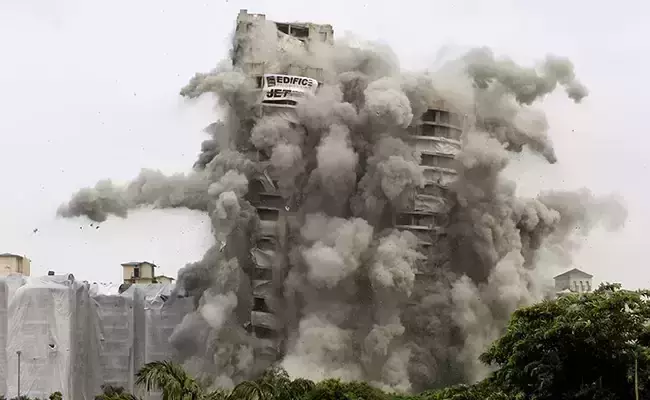
Twin towers: Doctors warn health hazards; advise staying away
text_fieldsNew Delhi: Post the demolishment of the twin towers in Noida on Sunday, doctors warned people living nearby to avoid the area for a few days, particularly those with respiratory diseases, PTI reported.
The demolition of the 100-metre-tall buildings blasted huge dust clouds into the air, and doctors cautioned that most dust particles are 5 microns or less and can remain suspended in the air for days unless there are strong winds to ventilate or rains.
Doctors said that severe dust pollution might lead to itching in the eyes, nose and skin, coughing, sneezing, breathing difficulty, lung infection, nasal congestion, asthmatic attacks, and aggravating heart problems.
Dr Jugal Kishore of Safdarjung Hospital said, "The dust particles will remain suspended for quite some time in case of low wind speed. People suffering from respiratory problems -- chronic obstructive pulmonary disease, asthma and bronchitis -- should avoid the area, if possible."
"They should limit exposure to the affected area for at least 48 hours. Others living in and around the area should avoid exercise for a few days," he, head of the Community Medicine department at Safdarjung hospital, said.
Dr Yudhyavir Singh at AIIMS said, "Particulate matter of size smaller than 2.5 microns will be a problem. This is likely to increase episodes of coughing, sneezing, asthmatic attacks, lung infection, nasal congestion, and breathing difficulty. Viruses may also piggyback the fine particles and increase infection rate, as it's the flu season."
Singh, an Assistant Professor in Critical Care at AIIMS, continued, "People should take precautions and keep a buffer stock of medicines. Use N-95 masks and eyeglasses till pollutants dissipate. Wear full-sleeve clothes and avoid morning walks for a few days. Consult doctors if problems worsen."
Meanwhile, Dr Dipankar Saha, former chief of the Central Pollution Control Board's air lab, suggested that Noida authorities need to monitor the air pollution level using low-cost sensors till the debris is cleared.
"Modelling should be done to ascertain the zone of influence. The people living in and around the area should monitor air quality and step out only in unavoidable circumstances. Avoid exposure for a few days. Water sprinkling at regular intervals will help immensely," Saha opined.
He further said that the air pollution problem would continue until debris is cleared. He added that a study must be conducted to map the impact of the demolition, which will undoubtedly affect people's health.
The buildings, taller than the historic Qutub Minar, were the tallest to be demolished in India. More than 3,700 kg of explosives were used to bring down the structures after a Supreme Court order observed that they were built violating norms.
Around 5,000 residents of Emerald Court, where the structures stood, and adjoining ATS Village societies in Sector 93A vacated their premises on Sunday morning and took away 150-200 pets, including cats and dogs, with them for the day. The closest buildings next to the twin towers are Aster 2 and Aster 3 of Emerald Court society which are just nine metres away.
























